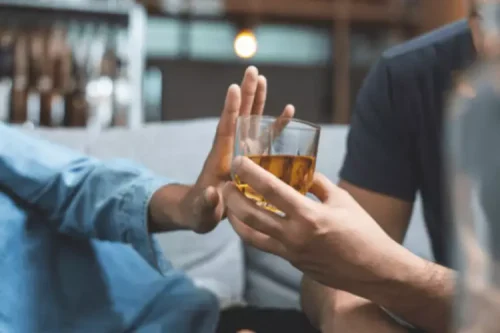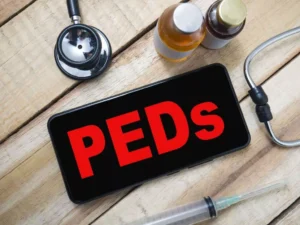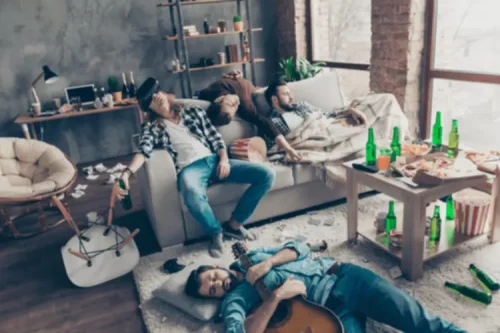
Alcohol may also exert some of its effects on sleep by influencing the circadian rhythm. The circadian rhythm is responsible for keeping the body anchored to a 24-hour cycle. As part of this 24-hour cycle, the body releases a hormone called melatonin to prepare us for sleep in the evening. Older studies have found that drinking alcohol before bedtime lowers melatonin levels and interferes with core body temperatures, which in turn impacts sleep quality. Alcohol is a muscle relaxant, so consuming alcohol at bedtime can make a person more prone to experience a blocked airway.

Alcohol and Insomnia: That Nightcap Might Keep You Up at Night
Those effects of alcohol on the biological clock appear to persist even without additional drinking, according to research. When alcohol has been introduced to the sleep cycle, the functions of the brain are impeded, and the cycles become disrupted. This is particularly true if you drink within an hour of bedtime. This sleep cycle disruption is what causes the person to feel tired and “fuzzy” the next day and can lead to further sleep issues, such as insomnia or alcohol addiction over time.
- Parasomnias are abnormal or problematic behaviors that can occur during sleep.
- Anyone who’s ever indulged in a drink or two knows that alcohol can make you real sleepy, real fast.
- If you’re regularly drinking alcohol to help you fall asleep, particularly if you have insomnia, it’ll probably make your sleep problem worse.
Wine: The Solution To A Good Night’s Sleep?

The next morning, you may not even remember waking during the night, but you’ll wake up feeling under-rested due to falling in and out of sleep repeatedly. Research also shows that those who drink alcohol before bedtime may experience a rebound in the second half of the night. In this case, they will does alcohol help you sleep transition from deep sleep imbalanced in favor of NREM sleep to restless sleep with a shift in favor of longer-than-normal periods of REM sleep. Consuming alcohol could also result in an imbalance in the sleep stages you experience. This deep, slow-wave sleep is critical to getting good-quality rest.
- Because of the damage that alcohol can do to your sleep cycles, sleep problems are common, even if you stop drinking.
- The ritual of signifying the end of the day by sitting down with a drink is hard to give up unless we have an enticing alternative.
- This issue creates a vicious cycle that will never leave a person feeling well-rested.
Health Categories to Explore
- Proceed with caution when drinking before bedtime, as alcohol may be affecting your sleep more than you realize.
- How much alcohol you drink and when you drink it can both influence sleep.
- Sunnyside uses a psychology-based approach to help you drink more mindfully, no matter what your goal is.
According to the NIAAA, that’s approximately how long it takes an adult to metabolize one drink on an empty stomach. “Studies have also shown that alcohol use leads to longer durations of apneas, along with a more dramatic drop in oxygen levels,” Dr. Shelgikar says. “It takes about three hours to metabolize alcohol,” Dr. Shelgikar says.

When a person drinks alcohol, doing so in small or moderate amounts several hours before sleep can reduce the chance of sleep issues. Individuals living with AUD experience much poorer sleep quality than those who consume moderate amounts of alcohol. They experience limited REM sleep, which can affect their health. People who drink alcohol before sleep are also more likely to experience breathing difficulties at night. They will also experience shorter periods of sleep, resulting in less restful sleep overall. Likewise, long-term reliance on alcohol for sleep can contribute to an alcohol use disorder (AUD).
How Does Soda Affect Sleep?
Bringing attention to our habits is always the first step in changing them. Next time you’re drinking, use a measuring cup to pour out 5 ounces of wine, 12 ounces of beer, or 1.5 ounces of spirits. Do this with every drink you have in order to keep yourself honest. In a notebook, keep track of how many drinks you have each day, and rate your overall anxiety, depression, and sleep quality. It both increases dopamine levels (leading to feelings of euphoria) and inhibits excitatory neurotransmitters, which slows down your brain functioning.

REM Sleep Disorder and Alcohol
Alcohol has a diuretic effect that causes your body to release more water in the way of urine. The result is a lot of trips to the bathroom and a (mostly) sleepless night. Simply cutting back or giving up alcohol or other drugs can be enough to reverse the negative impacts on your sleep (and can greatly improve your health overall). Sleepwalking and parasomnias — You may experience moving a lot or talking while you’re sleeping. There’s a chance you’ll physically act out your dreams in your sleep, or even sleepwalk.
There is a great deal of help for people who are alcohol-dependent and want to stop drinking. “If you have a glass of wine with dinner at 8 and then go to bed at 11, it’s not a big deal,” Dr. Winter says. “But consuming an entire bottle of wine every night, beginning when you’re cooking and finishing it after the meal, is a big deal.” “Furthermore, alcohol dramatically decreases REM sleep in the first half of the night and potentially the entire night,” Dr. Shelgikar says.
- However, in the second half of a night’s sleep, alcohol diminishes the amount of REM sleep.
- Studies have shown that when you get up the next day, you may be less alert because of your drinking the night before, even though you no longer have alcohol left in your body.
- Usually, your brain releases anti-diuretic hormone as needed to tell your kidneys to hold onto water.
- If you’re at a party, you could try opting for a soft drink or glass of water between alcoholic drinks, which will help keep you hydrated and mean you drink less alcohol over the night.
No Comments
Leave a Comment
trackback address